Social Work Skills and Competencies
In this section, I will highlight social work skills and competencies that I feel I will bring to my future social work practice. I will speak to skills at a micro, mezzo, and macro level, although many of these skills can be used at multiple levels. Micro level is direct intervention and one-on-one support of clients; the mezzo level is focused on community groups or organizations, and the macro level is focused on creating change through policy and organizational work. Below I have grouped each skill by micro, mezzo and macro to introduce them before I speak to my strengths and challenges with each social work skill individually.
Micro
Use of Self
Rapport Building
Critical Thinking
Assessment
Mezzo
Integrity
Reliability
Organization
Flexibility
Macro
Advocacy
Problem-Solving
Leadership
Research
Micro
Use of Self: The use of self in my future social work practice feels important to me because I feel that it aligns with the Value of Integrity in the Canadian Association of Social Workers [CASW] Code of Ethics. The Code of Ethics outlines that social workers act with integrity and are honest, trustworthy, responsible and accountable (CASW, 2024). I am upholding the CASW Code of Ethics values by being authentic in practice. I feel that I have strengths in this area because I am genuine in my interactions, and I strive to use humour and transparency when working with service users.
I do find some challenges in this area around self-disclosure and the use of self. I think that my personality is apparent in my interactions but I do find I am a bit guarded with personal information. I do not think that is a flaw, as I am upholding boundaries and not making the focus of my interactions about me. However, I do know there is value in self-disclosure, so I would like to be more comfortable disclosing information that would be beneficial for building rapport and normalizing experiences.
Pictured Below: When I worked in Long Term Care, the kitchen staff would often ask me to pick a theme to decorate the menu board. I enjoyed this as it allowed me to add a bit of beauty and fun to the environment! When I would work on my theme for the month, residents would often stop to chat with me and share stories. It was neat because my drawings created conversation while allowing the residents to have a glimpse into my personality and interests. I felt like it allowed me to add self-disclosure to the conversation in a way that felt comfortable.
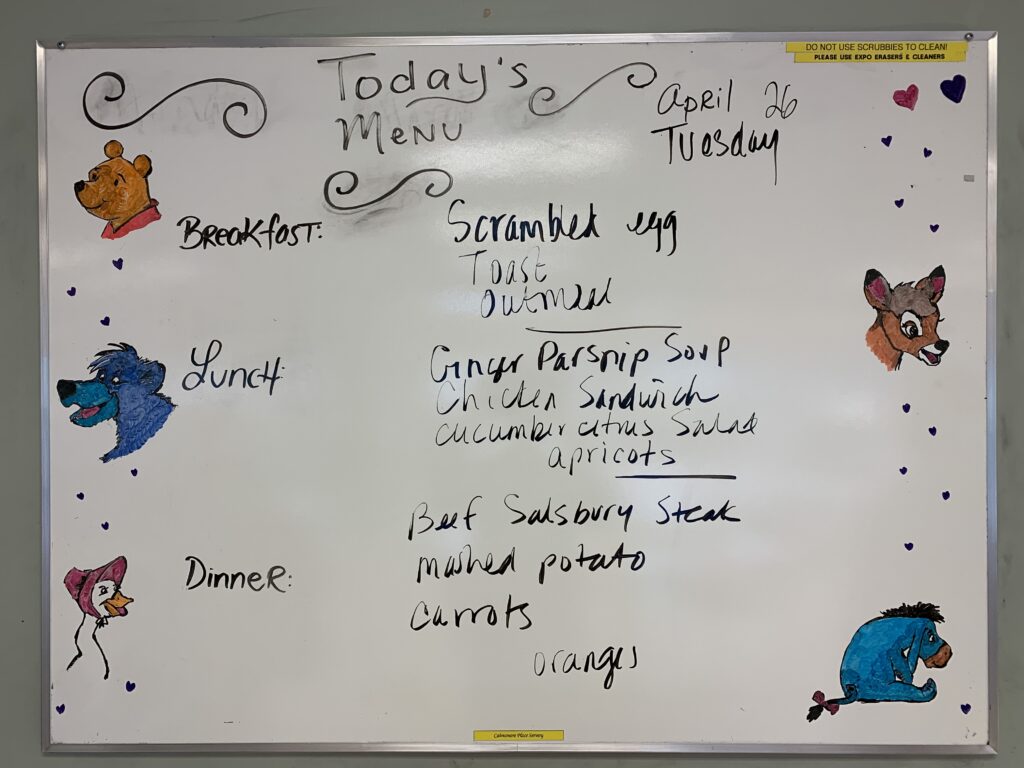
Rapport Building: To continue with the theme of self-use, rapport building is one of the skills I will bring to my future social work practice. Rapport building encompasses other skills in practice. For example, empathy and active listening help build rapport with service users because they show that the listener is non-judgmental and interested in understanding (Shebib, 2022). I do my best to engage others with kindness and a smile, as I feel it is easier to communicate with someone who appears kind and non-threatening. I think my strengths in rapport building come from kindness.
I do find it challenging to build rapport when the other individual is quite closed off, but I imagine I am not alone in that! In those situations, I seek to be respectful and not to make the other individual uncomfortable. I try to use humour when appropriate and also honour that engagement is a choice in an unmandated setting. In those cases, I will respect if a client does not wish to speak with me.
Critical Thinking: Critical thinking allows me to analyze themes such as power, equity,
social justice, positionality, history, context, and diversity of knowledge in assessment (Finn, 2021). Additionally, critical thinking allows me to challenge the oppressive practices I witness within organizations.
Critical thinking has helped me with funding applications during practicum. I have found that I have strengths in being able to consider multiple facets of an individual’s identity to access potential funding outside of the usual sources considered on the unit. I tend to be an overthinker, so I feel that one of the challenges I have with critical thinking is that I may tend to focus on smaller details that are not as relevant as other details.
Assessment: Assessment is one of the cornerstones of practice and there are many unique ways a practitioner may approach it. Although I may use paper assessment tools such as the MoCA (Montreal Cognitive Assessment), I find great value in conversation in assessment or a narrative approach. Narrative, constructivist, humanistic, and other phenomenological approaches emphasize each client’s unique experience and the inherent ability of each person to adapt and find their own solutions (O’Hara, 2019). A narrative approach can help an experience feel less clinical and welcoming as the practitioner frames it as a conversation rather than checking off boxes on a piece of paper. I feel my strengths in assessment lie in my ability to frame assessment as a conversation which helps to remove the clinical aspect.
Social work skills, such as the use of self and rapport-building, which I touched on earlier, are helpful tools when considering assessment as they help a client trust their practitioner and feel comfortable sharing their experience. One aspect I find challenging about assessment is mostly linked to experience. It can still feel a bit clunky when I am adapting questions into the conversation, or at times; I feel like I may be missing information or not asking enough follow-up questions to gain a deeper understanding. My practicum placement has helped me gain valuable experience and shadow social workers during assessments to see the techniques they use when gathering information from a client.
Mezzo
Integrity: Integrity is a value that is very important to me and one that is reflected in the CASW Code of Ethics. Social workers act with integrity and honesty and are responsible, trustworthy and accountable (CASW, 2024). Integrity is one of the most important skills in my toolbox because it is the foundation of the other skills I have listed. Without integrity, I cannot be genuine and trustworthy in my interactions, which would make it challenging to build rapport and successfully support service users. My strength in integrity is that it comes quite naturally to me in practice due to integrity being a strong theme in my upbringing.
I find being completely honest can be challenging in difficult situations where you do not want to tell someone an outright “no.” However, honesty is important, and there is a way to be sensitive and supportive even when delivering challenging news to service users. I have had great examples of this in my practicum. I know that I will hold myself to that example even in times when I am nervous about disappointing others with information that may not be the outcome we had hoped for.
Reliability: To me, reliability is a cornerstone in our relationships with service users and organizations. I placed this skill as a mezzo skill as I am keen to have a positive reputation in the community. Especially if I am serving a group or running a program within a community. I feel that reliability is not just showing up on time when you’ve made a plan, but it is also being authentic, predictable (when possible) and compassionate. I want service users to know that they can rely on me to support them to the best of my ability. That way, if we do not succeed as we hoped, they will know that I did not cut corners or fail to follow through.
I feel that my strengths and challenges come from the same source when I consider reliability. I consider myself to be very reliable, and it is rare for me to miss appointments or work. However, I think it will be especially important for me to insert strong boundaries when working with clients. I understand the importance of boundaries and take them very seriously, but it is also not uncommon for me to take on extra work or work additional hours.
In fact, I am proofreading this now after work and have an example I would like to add. I cut my thumb this morning and ended up being late to work as I was in the emergency room receiving five stitches. My boss was texting me as I waited, assuring me that I did not need to come to work, but it was hard for me to grapple with the idea of not going to work. I could still walk and drive, so I ended up there! I could not picture missing work due to my own clumsiness with an apple cutter! However, maintaining solid boundaries is important as a practitioner not only for self-care but also to ensure empowerment and a strengths-based approach. Being overly available can create a reliance on the social worker for service users and make the ending stage of a working relationship difficult to navigate. So, hopefully, I will not slice any more fingers, but perhaps I will take the day off next time to practice!
Organization: Organization is a highly transferable skill, and I use it daily as administrative support for two psychiatrists, one physician, and a team of twelve nurses. This role has provided great experience in booking appointments and prioritizing workload. Being organized ensures that I can keep track of the appointments I have booked and which clients are due for follow-up. As a social worker, it will be important to be organized in order to manage a caseload, prioritize the appropriate cases and multi-task.
My strengths in organization come from my experience and roles that have required the ability to multi-task. My challenges with organization mainly relate to taking on too many tasks, which can make it more difficult to keep things organized, but I do enjoy keeping busy! In my future role as a social worker, it’ll be important to maintain balance in my workload.
Flexibility: Flexibility is an important social work skill to me because we may be working with individuals experiencing multiple barriers, so understanding and flexibility can help remove an additional barrier to support. For example, if my client needs to take the bus to our appointments, I would not hold it against them if they arrived late due to a delay from the bus. Flexibility also extends to planning and setting goals with clients. Practitioners can often offer clients a fair amount of latitude and flexibility with regard to how they participate in treatment and pursue their treatment goals (O’Hara, 2019).
This is another skill where my strengths and challenges come from the same source. My strengths in flexibility come from my easy going attitude and my desire to support others. If anything, I may tend to be overly flexible and accommodating, so I must ensure that I do not make excuses for service users or coworkers or put myself out to accommodate others.
Macro
Advocacy: Although advocacy is an area that I feel I have much to learn, I do believe I have shown advocacy skills in the community. Advocacy is essential in social work because to best serve our clients, we may need to promote a position or cause in order to support equity and accessibility (Unsicker, 2012). Advocating for increased signage on the Cowichan River taught me how consulting with others and creating relationships in the community strengthened my message and produced more responses and results. When considering advocacy at a macro level, policy change cannot result without power shifts; the general public often needs to build their people power, capacities and resources to challenge elite groups (Unsicker, 2012). By working with relevant community partners and sharing my goals on social media, I learned about the value of community networking and resource sharing.
My challenges with advocacy have come from a lack of experience; it used to be very daunting, and I did not know where to begin. However, my education has taught me about helpful approaches such as community networking. Because of this, I have built strengths in outreach. I have developed confidence in identifying relevant stakeholders and contacting them to ask for support. I would like to expand my understanding of advocacy at a macro level as I am intrigued by policy change in healthcare settings and recognizing gaps in community services. For example, working for Island Health at Geriatric Speciality Services, I recognize a gap for older adults who need additional support to remain independent at home but are not ready for Long Term Care placement. Additionally, the waitlist for Long Term Care is substantial. If individuals have a sudden decline, they may end up hospitalized waiting for a Long Term Care bed due to the lack of community support.
In the past, I have emailed Island Health’s Diversity and Inclusion Officer about increased accessibility in the hiring process in hopes of creating additional support in the workplace for individuals living with disabilities. I included the reply to the email below; unfortunately, when I attempted to follow up, the position had been filled by a different individual who did not reply to my email. However, I should keep trying, so I will go back to the drawing board with that idea!
Pictured Below: The email response from the Inclusion and Diversity officer regarding accessibility in hiring within Island Health.
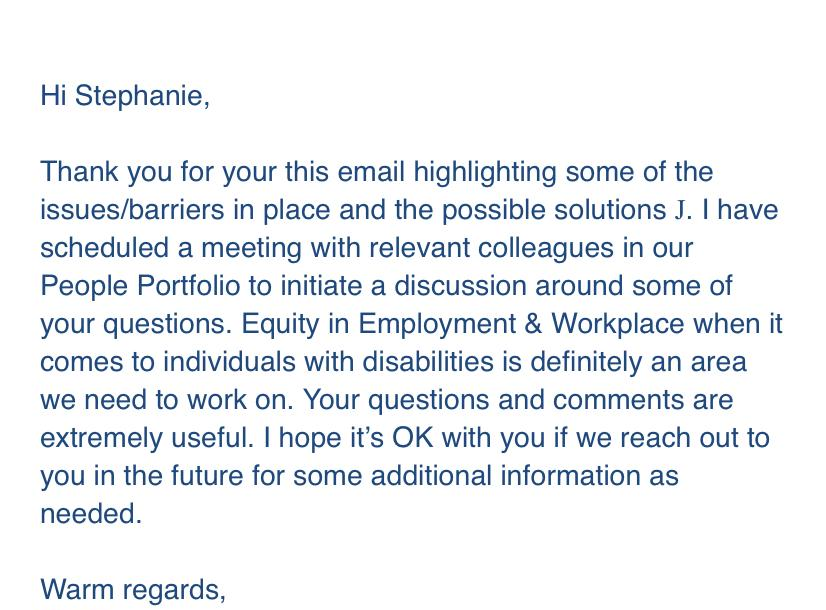
Problem-Solving: I like to think outside of the box in my approaches and consider problems from multiple angles. I tend to think of myself as quite tenacious as well! When I consider my future social work practice, I know that I will not be discouraged if the original avenue I explore with a service user does not yield the result we hoped for. Instead, I will regroup and get creative in my problem-solving to find a solution that best supports my service user. I believe my strengths in problem-solving come from being open to collaboration, and I look forward to working together with service users to create solutions to challenges. A challenge I have with problem-solving is I tend to get a bit carried away! I will need to rein myself in and ensure I am seeking full collaboration from the service user. It is not because I doubt their ability, I just get excited about the possibilities!
Leadership: When I think about myself in a leadership role, I picture a collaborative approach. Relational leaders use relationships as conduits for sharing knowledge, building capacity, enhancing participation and accessing resources to mobilize relationships to engage in leadership from within and below (Finn, 2021). I am drawn to leadership roles because I believe leadership means being actively involved in your team, supporting them and providing the resources they need to perform to the best of their abilities. I often see leaders who work in different buildings from their teams and do not even know the names or roles of all of their staff. To me, that is not leadership and is just a way to gain a paycheque and make others listen to the arbitrary rules you have created without consulting the people these rules impact. My strength in leadership is my drive to be involved with every team member and understand each participant’s role so that I can better understand how to support them. I truly believe in a team setting, and I do not think anyone should work in isolation. A well-managed team is a powerful force!
The biggest challenge to leadership for me is not challenging it! I work very easily within a team and follow directions, but when I witness distanced leadership, it is hard for me not to challenge these authority figures and question their role within the team. A leadership skill I would like to develop would be how to collaborate with leadership and advocate for more involved leaders. I do not need to be directly in leadership in order to facilitate change; I can be a leader in any position by challenging injustice and changing mindsets, being a conduit for change, and organizing relationships and resources (Finn, 2021).
Research: Research is a passion of mine because I always want to know the reason behind everything. My phone always has an internet tab open with a search I have saved to read up on later. Research can help better identify gaps in services and provide the evidence needed to create change at a policy level. At my position with Geriatric Specialty Services, we have a research team from Island Health currently working with our clinic to identify gaps in services for older adults in the Cowichan Valley. Due to confidentiality, I am actually the recruiter for the study, and the patient’s information is only shared with the research team after I receive consent. I explain the study in detail and ensure the client understands that if they provide consent to participate, they can revoke this consent at any time and opt not to participate. This approach reflects CASW Guiding Principle 1.6, which states that “social workers respect the rights of service users to make decisions based on voluntary consent when possible” (CASW, 2024).
Side note: The Senior’s Outpatient Clinic physician at Geriatric Specialty Services is a believer in the MINT (Multispeciality, INterprofessional Team) model of care inspired by the MINT memory clinic, which is a collaborative, interdisciplinary approach. I shadowed the Geriatric Evaluation Management team for two days during my practicum at Nanaimo Regional General Hospital, and they shared the MINT training model with me; it was very interesting, and I am hopeful the study being conducted at our clinic will inspire this model to be implemented in the Cowichan Valley. As of now, only Victoria and Nanaimo have MINT clinics despite the number of older adults in the Cowichan Valley. Due to Island Health’s geographic catchment rules, adults in the Cowichan Valley would not be eligible for services in Nanaimo or Victoria in most circumstances.
My strengths related to research are linked to my ongoing desire to learn and understand. As a current research recruiter, I also draw on my skills related to the use of self and rapport-building to encourage participation without pressuring clients. My challenges with research come from my inexperience. Completing and publishing research seems very daunting to me! But it is an interest of mine, and I believe that, in time, I will become more involved with it. However, I also see research through the lens of gathering information and learning. I am always eager to learn, and in my spare time, I complete courses on Learning Hub (through Island Health) to ensure I am expanding my knowledge and continuously learning.
Pictured Below:The MINT Memory Clinic Training Manual and two recent courses I have completed on Learning Hub: Culturally Safe Advance Care Planning and Dementia Care.
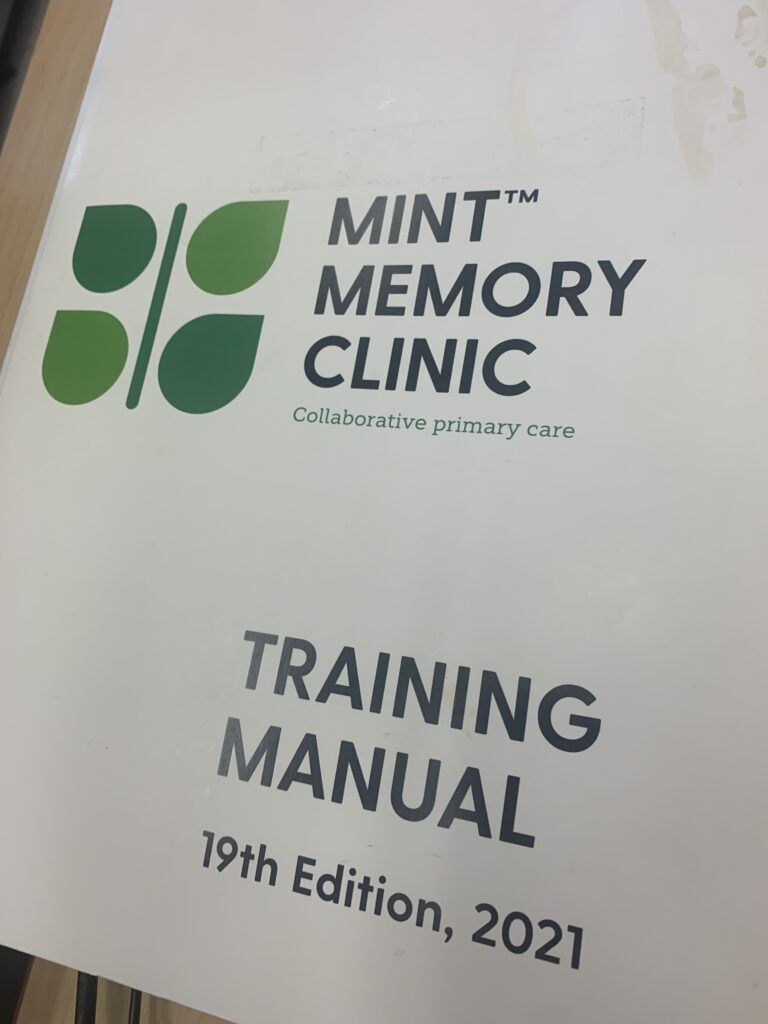
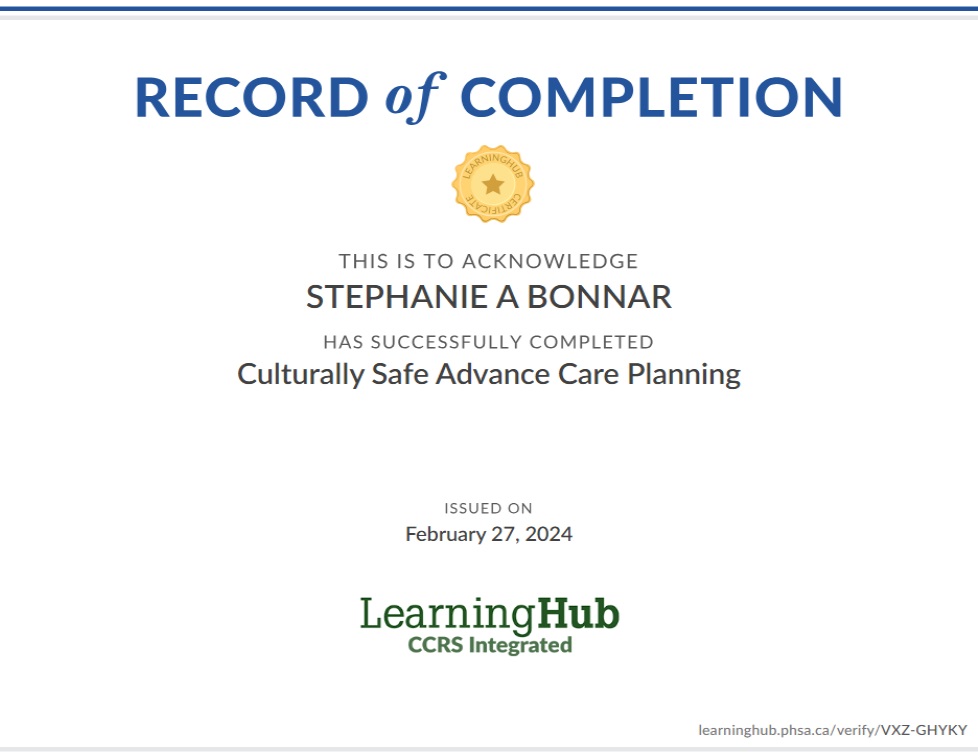
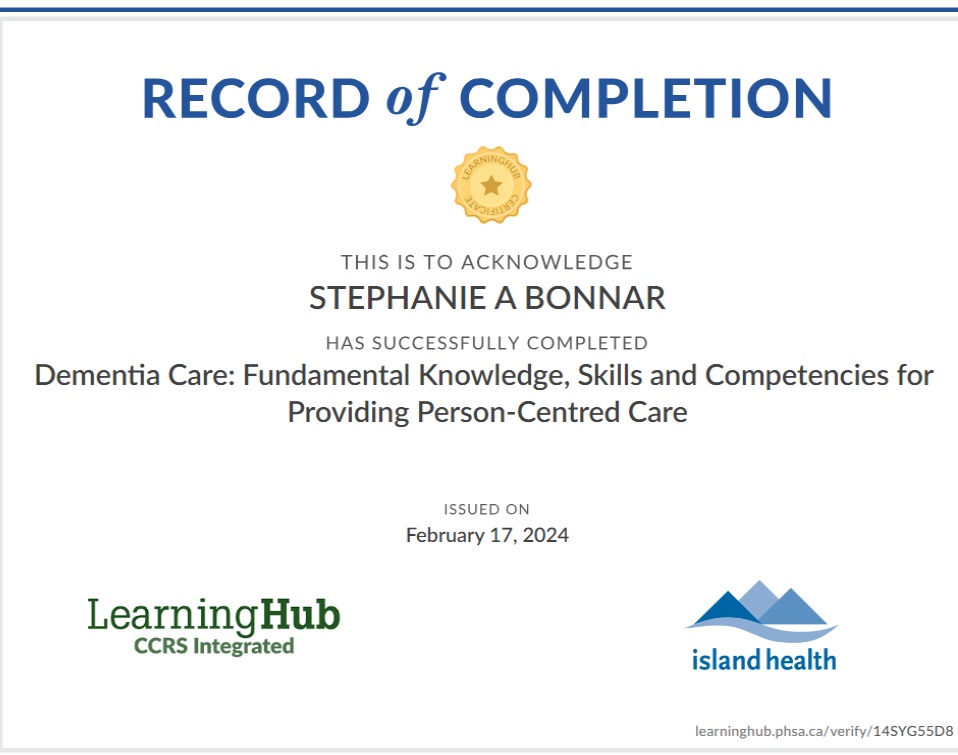
In this section, I have identified social work skills while providing examples of my strengths and challenges with each. I do find it challenging to acknowledge my skills as I often get caught in the trap of imposter syndrome or viewing myself through a deficit lens. In situations when I am applauded at work, I get uncomfortable because, in my mind, I am just “doing my job,” so it feels strange to be told I have gone above and beyond in instances where I cannot picture an alternative. I suppose that ties back to the values of hard work and integrity I shared in the values section!
However, reflection is an integral social work skill. Although we should always be evolving and growing our skills, it is important to acknowledge what we do well as social workers. I have been grateful for this space to explore my skills while also identifying how I could continue to strengthen those skills. There is nothing wrong with admitting you are good at something!